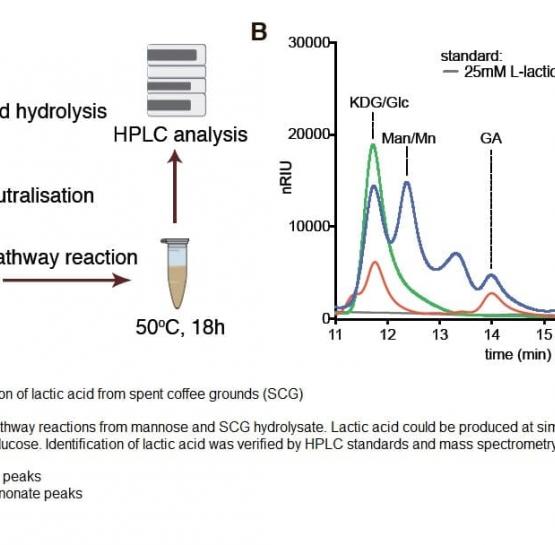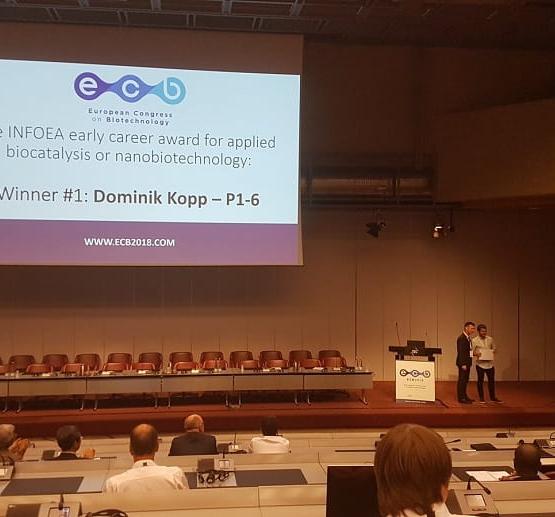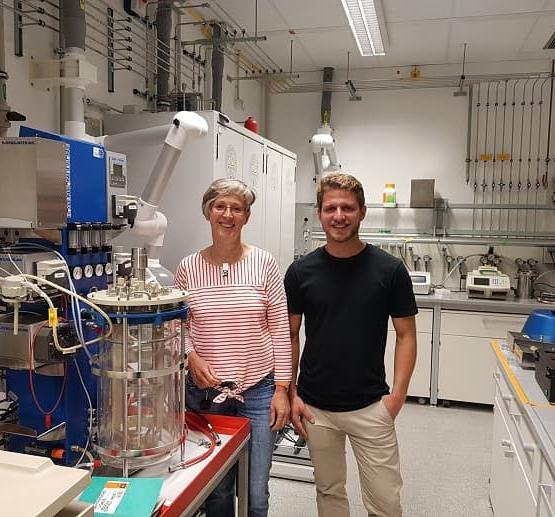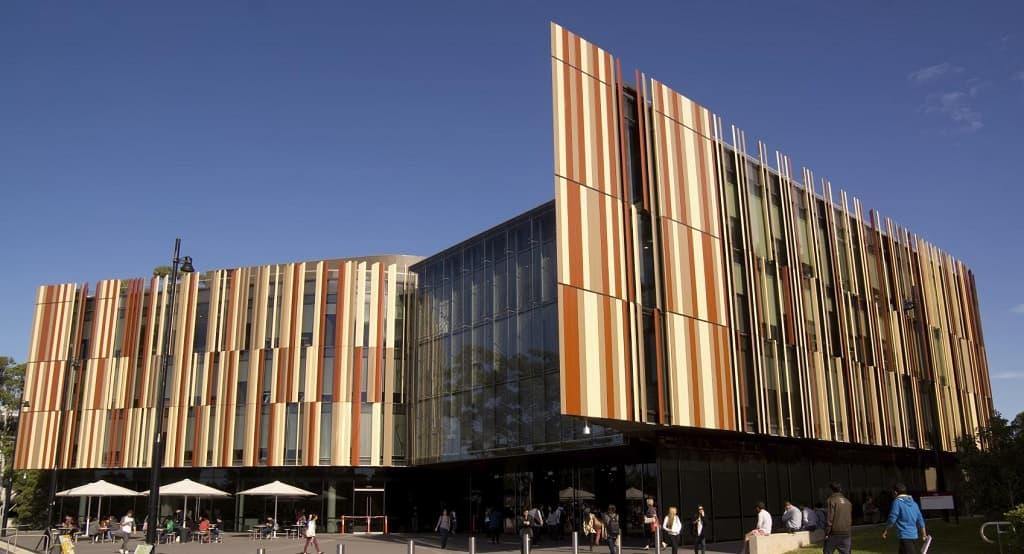Дата публикации: 11.12.2018
Dominik Kopp, a student at one of the best Australian universities, Macquarie, has developed a way to transform spent coffee grounds into biodegradable disposable coffee cups.
Only in Sydney, more than nine hundreds cafes and restaurants annually produce more than three thousand tons of coffee waste. The bulk of this waste is not recyclable and is sent to landfills where it produces greenhouse gases that contribute to global warming that is environmentally destructive. Dominik has developed a method of the lactic acid synthesis from spent coffee grounds, which can be used to produce biodegradable plastic and now he improves the process while working on his PhD thesis.



Cell-free Synthetic Pathway for the Conversion of Spent Coffee Grounds into Lactic acid, source Macquarie University
“Australians consume six billion cups of coffee daily, and the coffee grounds are used to make these coffees only once”, says researcher Dominik.
However, about half of the cafe's waste is made up of sugars, which are an ideal raw material for conversion into valuable biochemical chemicals obtained from plant or animal based raw materials, rather than crude oil.
Dominic was awarded with the INOFEA Early Career Award for his research project, which he presented at the 18th European Biotechnology Congress. “The simple idea that we turn waste into a valuable and sustainable product is extremely interesting!”, says the student. Hopefully, he will manage to bring his method to perfection and in a few years all over the world people will be able to use cups made from yesterday's coffee.
Dominik Kopp wins first place at "Early Career Award for Applied Biocatalysis/Nanobiotechnology", photo © Macquarie University
Lactic acid can be used in the production of biodegradable disposable utensils, offering a more sustainable and environmentally friendly alternative to plastics derived from fossil fuels. You can use this material to do anything from product packaging to medical supplies.
In an interview, the student reveals a source of inspiration. “The ancient organism from which we get gene sequences is the thermophilic archeon Thermoplasma acidophilum”, says Kopp. "Archaea are considered the oldest organisms, but this does not mean that they are extinct or outdated." Thermoplasmic acidophilus - an organism about a micrometer in size, aerobic unicellular. It does not have a cell wall, it is able to grow in a complex environment and temperatures close to 56 ° C and the pH level of 1.8. The thermoplasm membrane has a unique structure developed to withstand osmotic pressure, high acidity and temperatures.
Dominik Kopp and Prof. Bettina Siebers, photo © Macquarie University
“I think my project is one of many interesting and modern approaches to how to use synthetic biology in a responsible way to develop a more sustainable and environmentally friendly industry that does not rely on crude oil”, says Dominik.
Julia Timofejeva, Russia, St. Petersburg
Here can be your advertising!
Articles
07.12.2018
Latest electronics
Electronic gadgets that hit the world in 2018
23.07.2019
Solar panels of the future
Perovskite panels will replace silicon solar panels
17.05.2018
Robot Daisy by Apple protects ecology
Apple introduced a new robot that recycles old iPhones
Дата публикации: 11.12.2018
Dominik Kopp, a student at one of the best Australian universities, Macquarie, has developed a way to transform spent coffee grounds into biodegradable disposable coffee cups.
Only in Sydney, more than nine hundreds cafes and restaurants annually produce more than three thousand tons of coffee waste. The bulk of this waste is not recyclable and is sent to landfills where it produces greenhouse gases that contribute to global warming that is environmentally destructive. Dominik has developed a method of the lactic acid synthesis from spent coffee grounds, which can be used to produce biodegradable plastic and now he improves the process while working on his PhD thesis.
Cell-free Synthetic Pathway for the Conversion of Spent Coffee Grounds into Lactic acid, source Macquarie University
“Australians consume six billion cups of coffee daily, and the coffee grounds are used to make these coffees only once”, says researcher Dominik.
However, about half of the cafe's waste is made up of sugars, which are an ideal raw material for conversion into valuable biochemical chemicals obtained from plant or animal based raw materials, rather than crude oil.
Dominic was awarded with the INOFEA Early Career Award for his research project, which he presented at the 18th European Biotechnology Congress. “The simple idea that we turn waste into a valuable and sustainable product is extremely interesting!”, says the student. Hopefully, he will manage to bring his method to perfection and in a few years all over the world people will be able to use cups made from yesterday's coffee.
Dominik Kopp wins first place at "Early Career Award for Applied Biocatalysis/Nanobiotechnology", photo © Macquarie University
Lactic acid can be used in the production of biodegradable disposable utensils, offering a more sustainable and environmentally friendly alternative to plastics derived from fossil fuels. You can use this material to do anything from product packaging to medical supplies.
In an interview, the student reveals a source of inspiration. “The ancient organism from which we get gene sequences is the thermophilic archeon Thermoplasma acidophilum”, says Kopp. "Archaea are considered the oldest organisms, but this does not mean that they are extinct or outdated." Thermoplasmic acidophilus - an organism about a micrometer in size, aerobic unicellular. It does not have a cell wall, it is able to grow in a complex environment and temperatures close to 56 ° C and the pH level of 1.8. The thermoplasm membrane has a unique structure developed to withstand osmotic pressure, high acidity and temperatures.
Dominik Kopp and Prof. Bettina Siebers, photo © Macquarie University
“I think my project is one of many interesting and modern approaches to how to use synthetic biology in a responsible way to develop a more sustainable and environmentally friendly industry that does not rely on crude oil”, says Dominik.
Julia Timofejeva, Russia, St. Petersburg
Here can be your advertising!
Articles
07.12.2018
Latest electronics
Electronic gadgets that hit the world in 2018
23.07.2019
Solar panels of the future
Perovskite panels will replace silicon solar panels
17.05.2018
Robot Daisy by Apple protects ecology
Apple introduced a new robot that recycles old iPhones
Дата публикации: 11.12.2018
Dominik Kopp, a student at one of the best Australian universities, Macquarie, has developed a way to transform spent coffee grounds into biodegradable disposable coffee cups.
Only in Sydney, more than nine hundreds cafes and restaurants annually produce more than three thousand tons of coffee waste. The bulk of this waste is not recyclable and is sent to landfills where it produces greenhouse gases that contribute to global warming that is environmentally destructive. Dominik has developed a method of the lactic acid synthesis from spent coffee grounds, which can be used to produce biodegradable plastic and now he improves the process while working on his PhD thesis.
Cell-free Synthetic Pathway for the Conversion of Spent Coffee Grounds into Lactic acid, source Macquarie University
“Australians consume six billion cups of coffee daily, and the coffee grounds are used to make these coffees only once”, says researcher Dominik.
However, about half of the cafe's waste is made up of sugars, which are an ideal raw material for conversion into valuable biochemical chemicals obtained from plant or animal based raw materials, rather than crude oil.
Dominic was awarded with the INOFEA Early Career Award for his research project, which he presented at the 18th European Biotechnology Congress. “The simple idea that we turn waste into a valuable and sustainable product is extremely interesting!”, says the student. Hopefully, he will manage to bring his method to perfection and in a few years all over the world people will be able to use cups made from yesterday's coffee.
Dominik Kopp wins first place at "Early Career Award for Applied Biocatalysis/Nanobiotechnology", photo © Macquarie University
Lactic acid can be used in the production of biodegradable disposable utensils, offering a more sustainable and environmentally friendly alternative to plastics derived from fossil fuels. You can use this material to do anything from product packaging to medical supplies.
In an interview, the student reveals a source of inspiration. “The ancient organism from which we get gene sequences is the thermophilic archeon Thermoplasma acidophilum”, says Kopp. "Archaea are considered the oldest organisms, but this does not mean that they are extinct or outdated." Thermoplasmic acidophilus - an organism about a micrometer in size, aerobic unicellular. It does not have a cell wall, it is able to grow in a complex environment and temperatures close to 56 ° C and the pH level of 1.8. The thermoplasm membrane has a unique structure developed to withstand osmotic pressure, high acidity and temperatures.
Dominik Kopp and Prof. Bettina Siebers, photo © Macquarie University
“I think my project is one of many interesting and modern approaches to how to use synthetic biology in a responsible way to develop a more sustainable and environmentally friendly industry that does not rely on crude oil”, says Dominik.
Julia Timofejeva, Russia, St. Petersburg
Here can be your advertising!
Articles
07.12.2018
Latest electronics
Electronic gadgets that hit the world in 2018
23.07.2019
Solar panels of the future
Perovskite panels will replace silicon solar panels
17.05.2018
Robot Daisy by Apple protects ecology
Apple introduced a new robot that recycles old iPhones
